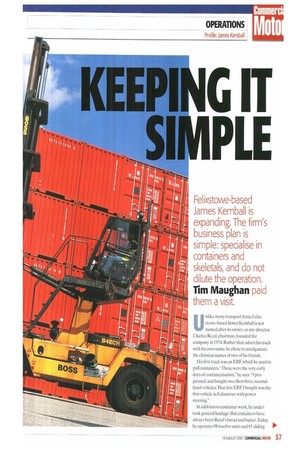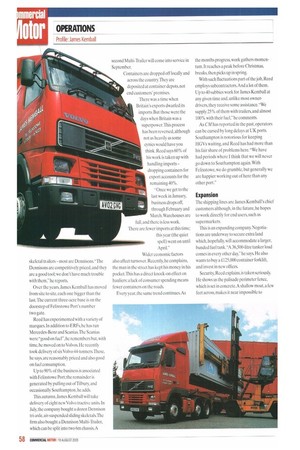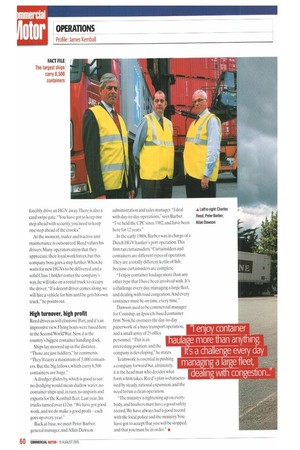EEiIG IT MPLE
Page 57

Page 58

Page 60

If you've noticed an error in this article please click here to report it so we can fix it.
Felixstowe-based James Kemball is expanding. The firm's business plan is simple: specialise in containers and skeletals, and do not dilute the operation.
Tim Maughan paid
them a visit.
Unlike many transport firms.Felixstowe-based James Kemball is not named after its owner, or any director. Charles Reed,chairman, founded the company in 1974. Rather than adorn his truck with his own name, he chose to amalgamate the christian names of two of his friends.
His first truck was an ERF, which he used to pull containers. "These were the very early days of containerisation," he says. 'I progressed, and bought two, then three, secondhand vehicles.That first ERF I bought was the first vehicle in Felixstowe with power steering.
In addition to container work, he undertook general haulage. But containers have always been Reed's bread and butter.Today, he operates 58 tractive units and 85 sliding PI' skeletal trailers — most are Dennisons."The Dennisons are competitively priced, and they are a good tool; we don't have much trouble with them," he reports.
Over the years, James Kemball has moved from site to site, each one bigger than the last. The current three-acre base is on the doorstep of Felixstowe Port's number two gate.
Reed has experimented with a variety of marques. In addition to ERFs, he has run Mercedes-Benz and Scanias. The Scanias were "good on fuel", he remembers but, with time, he moved on to Volvos. He recently took delivery of six Volvo 44-tonners.These, he says, are reasonably priced and also good on fuel consumption.
Up to 90% of the business is associated with Felixstowe Port; the remainder is generated by pulling out of Tilbury, and occasionally Southampton, he adds.
This autum n, James Kemball will take delivery of eight new Volvo tractive units. In July, the company bought a dozen Dennison tri-axle, air-suspended sliding skeletals.'The firm also bought a Dennison Multi-Trailer, which can be split into two 6m chassis. A second Multi-Trailer will come into service in September.
Containers are dropped off locally and across the country. They are deposited at container depots, not end customers' premises.
There was a time when Britain's exports dwarfed its imports. But those were the days when Britain was a superpower. This process has been reversed, although not as heavily as some cynics would have you think. Reed says 60% of his work is taken up with handling imports — dropping containers for export accounts for the remaining 40%.
-Once we get to the last week in January, business drops off, through February and March.Warehouses are full, and there is less work. There are fewer imports at this time; this year (the quiet spell) went on until April."
Wider economic factors also affect turnover. Recently, he complains, the man in the street has kept his money in his pocket.This has a direct knock-on effect on hauliers: a lack of consumer spending means fewer containers on the roads.
Every year, the same trend continues. As the months progress, work gathers momentum. It reaches a peak before Christmas, breaks, then picks up in spring.
With such fluctuations part of the job. Reed employs subcontractors.And a lot of them. Up to 40 subbies work for James Kemball at any given time and, unlike most ownerdrivers, they receive some assistance. "We supply 25% of them with trailers, and almost 100% with their fuel," he comments.
As CM has reported in the past, operators can be cursed by long delays at UK ports. Southampton is notorious for keeping HGVs waiting, and Reed has had more than his fair share of problems here."We have had periods where I think that we will never go down to Southampton again. With Felixstowe, we do grumble, but generally we are happier working out of here than any other port."
Expansion
The shipping lines are James Kemball's chief customers although, in the future, he hopes to work directly for end users, such as supermarkets.
This is an expanding company. Negotiations are underway to secure extra land which, hopefully, will accommodate a larger, bunded fuel tank. "A 36,500-litre tanker load comes in every other day,he says. He also wants to buy a £125,000 container forklift, and invest in new offices.
Security, Reed explains, is taken seriously. He shows us the palisade perimeter fence, which is set in concrete.A shallow moat, a few feet across, makes it near impossible to forcibly drive an HGV away. There is also a card swipe gate. "You have got to keep one step ahead with security, you need to keep one step ahead of the crooks," At the moment, trailer and tractive unit maintenance is outsourced. Reed values his drivers. Many operators stress that they appreciate their loyal workforces. but this company boss goes a step further.When he waits for new HGVs to be delivered, and a solid Class 1 holder comes the company's way, he will take on a rental truck to occupy the driver. "If a decent driver comes along, we will hire a vehicle for him until he gets his own truck," he points out.
High turnover, high profit Reed drives us to Felixstowe Port, and it's an impressive view. Flying boats were based here in the Second World War. Now, it is the country's biggest container handling dock.
Ships lay moored up in the distance. "Those are just tiddlers," he comments. "They'll carry a maximum of 3,000 containers. But the big fellows, which carry 8,500 containers, are huge."
A dredger glides by, which is good to see: no dredging would mean shallow water, no container ships and, in turn, no imports and exports for the Kemball fleet. Last year, his trucks turned over 12,12m." We have got good work, and we do make a good profit — each goes up every year."
Back at base, we meet Peter Barber, general manager, and Allan Dawson administration and sales manager."1 deal with day-to-day operations," says Barber. "I've held the CPC since 1982, and have been here for 12 years."
In the early 1980s. Barber was in charge of a Dutch HGV haulier's port operation.This firm ran curtainsiders."Curtainsiders and containers are different types of operation. They are a totally different kettle of fish, because curtainsiders are complete.
"I enjoy container haulage more than any other type that! have been involved with. It's a challenge every day, managing a large fleet, and dealing with road congestion. And every container must be on time, every time."
Dawson used lobe commercial manager for Contship. an Ipswich-based container firm. Now, he oversees the day-to-day paperwork of a busy transport operation, and a small army of 25 office personnel. "This is an interesting position, and the company is developing," he states.
Teamwork is essential in pushing a company forward but, ultimately, it is the head man who decides what form a firm takes. Reed's plan is characterised by steady, rational expansion, and the need to run a clean operation.
-The ministry is tightening up on everybody, and hauliers must have a good safety record. We have always had a good record with the local police and the ministry. You have got to accept that you will be stopped, and that you must be in order."
















































































































































































































